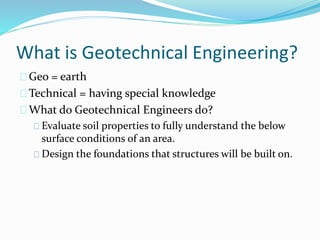Geotheta Things To Know Before You Get This
Geotheta Things To Know Before You Get This
Blog Article
The Best Strategy To Use For Geotheta
Table of ContentsIndicators on Geotheta You Need To KnowAll about GeothetaSome Known Details About Geotheta The Of GeothetaA Biased View of Geotheta

They perform website examinations, collect samples, do laboratory examinations, and analyze information to review the suitability of the ground for construction jobs - Engineer of Record. Based on their searchings for, geotechnical designers offer suggestions for structure layout, incline security, retaining frameworks, and mitigation of geotechnical dangers. They work together with other specialists, such as designers, structural engineers, and construction teams, to guarantee that geotechnical considerations are incorporated right into the overall project design and execution
By analyzing the habits and properties of dirt and rock, they can recognize possible geotechnical dangers such as landslides, dirt negotiation, or incline instability. Their proficiency assists stop failures or mishaps that can jeopardize lives and residential or commercial property. Here are some in-depth duties and obligations of a geotechnical engineer: Site Investigation: Geotechnical engineers conduct website examinations to gather information on subsurface problems.
They analyze the information to understand the residential properties and actions of the soil and rock, including their strength, leaks in the structure, compaction features, and groundwater conditions. Geotechnical Analysis and Style: Geotechnical designers analyze the data gathered throughout website examinations to analyze the stability and viability of the website for building and construction tasks. They execute geotechnical calculations and modeling to evaluate factors such as birthing ability, settlement, incline stability, lateral planet pressures, and groundwater flow.
Geotheta Things To Know Before You Buy
Structure Design: Geotechnical engineers play a critical duty in creating foundations that can safely sustain the desired framework. They assess the dirt problems and tons needs to establish the appropriate foundation type, such as shallow foundations (e.g., footings), deep structures (e.g (https://geotheta.carrd.co/)., piles), or specialized strategies like soil improvement. They think about aspects such as negotiation restrictions, birthing capability, and soil-structure communication to develop optimum foundation layouts
They evaluate building plans, monitor website activities, and carry out field assessments to validate that the layout referrals are adhered to. If unforeseen geotechnical concerns occur, they analyze the scenario and supply recommendations for remediation or modifications to the style. Threat Analysis and Reduction: Geotechnical engineers evaluate geotechnical risks and dangers connected with the project website, such as landslides, liquefaction, or dirt disintegration.

Cooperation and Communication: Geotechnical engineers function very closely with various other specialists associated with a project, such as engineers, structural designers, and building and construction groups. Efficient interaction and partnership are important to incorporate geotechnical factors to consider into the general job layout and building and construction procedure. Geotechnical designers offer technological knowledge, answer questions, and ensure that geotechnical needs are satisfied.
The Best Strategy To Use For Geotheta
Here are some kinds of geotechnical designers: Foundation Engineer: Structure designers specialize in developing and evaluating foundations for frameworks. They examine the soil problems, load demands, and website qualities to determine the most appropriate structure type and design, such as shallow foundations, deep structures, or specialized strategies like heap structures.
They assess the variables influencing incline stability, such as dirt residential or commercial properties, groundwater conditions, and incline geometry, and develop approaches to protect against incline failures and alleviate threats. Earthquake Engineer: Earthquake engineers specialize in evaluating and designing structures to endure seismic pressures. They examine the seismic hazard of a website, assess soil liquefaction potential, and create seismic style standards to guarantee the security and durability of frameworks throughout quakes.
They carry out area screening, collect examples, and evaluate the accumulated data to identify the dirt residential properties, geologic developments, and groundwater conditions at a website. Geotechnical Instrumentation Engineer: Geotechnical instrumentation engineers concentrate on tracking and determining the habits of dirt, rock, and structures. They install and preserve instrumentation systems that monitor factors such as soil negotiation, groundwater degrees, slope activities, and structural displacements to assess efficiency and supply very early cautions of prospective problems.
Geotheta for Dummies
They conduct examinations such as triaxial tests, consolidation examinations, direct shear examinations, and leaks in the structure examinations to collect information for geotechnical analysis and style. Geosynthetics Designer: Geosynthetics designers focus on the layout and application of geosynthetic products, such as geotextiles, geogrids, and geomembranes. They use these materials to improve soil stability, strengthen slopes, supply drainage services, and control disintegration.
They tend to be investigatory people, which suggests they're intellectual, reflective, and curious. They are interested, methodical, logical, logical, and logical. Some of them are additionally social, indicating they're kind, generous, participating, individual, caring, helpful, compassionate, sensible, and pleasant - Consulting Engineers.
In the office environment, geotechnical engineers utilize specialized software application tools to execute calculations, create styles, and examine information. They prepare reports, additional info review task specifications, communicate with clients and group members, and coordinate project tasks. The workplace setting offers a helpful atmosphere for research, evaluation, and collaboration with other specialists included in the project.
Geotheta - An Overview
They regularly check out task websites to perform website investigations, analyze geotechnical conditions, and collect information for analysis. These brows through involve traveling to different places, in some cases in remote or difficult terrains. Geotechnical designers may do dirt tasting, conduct tests, and monitor building activities to make sure that the geotechnical facets of the task are being executed correctly.
Geotechnical engineers additionally operate in specialized geotechnical research laboratories. In these centers, they carry out experiments, carry out tests on soil and rock samples, and examine the design buildings of the products. Geotechnical laboratory designers function thoroughly in these settings, handling screening devices, running instruments, and taping information. They collaborate with various other lab staff to make sure accurate and trustworthy testing results.
Report this page